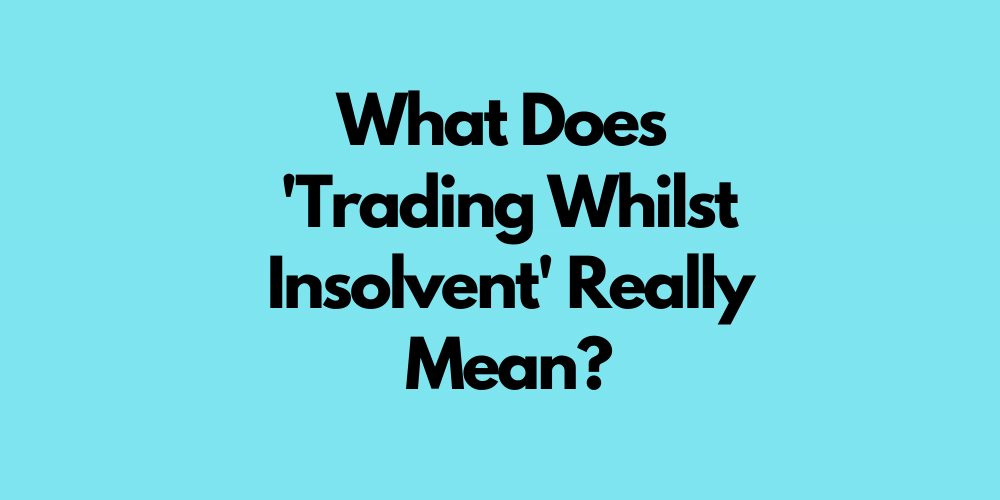What Does Trading Whilst Insolvent Actually Mean?

Introduction: What is 'trading whilst insolvent'?
Trading whilst insolvent is a criminal offence in the United Kingdom. The offence applies to companies and individuals. A company is trading whilst insolvent if it continues to trade when it cannot pay its debts as they fall due. An individual is trading whilst insolvent if he continues to trade when he cannot pay his debts as they fall due, or when he has reasonable grounds for believing that he will be unable to pay his debts as they fall due.
What are the consequences for company directors of trading whilst insolvent?
When a company director trades whilst insolvent, they are knowingly putting the company at risk. Company directors have a duty to act in the best interests of the company, and trading whilst insolvent can be seen as a breach of this duty. As a result, company directors can face consequences for their actions.
There are a number of signs that a company may be trading whilst insolvent or wrongful trading. One sign is that the company has been unable to pay its debts as they fall due.
Another sign is that the company has been forced to borrow money to pay its debts.
A third sign is that the company's assets are worth less than its liabilities.
A fourth sign of trading whilst insolvent or wrongful trading is that the company's profits have been falling for several years.
A fifth sign is that the company has been selling its assets at below their market value.
Finally, a sixth sign is that the company has been sued by its creditors.
What are some of the signs that a company may be trading whilst insolvent?
There are a number of signs that a company may be trading whilst insolvent or wrongful trading. One sign is that the company has been unable to pay its debts as they fall due. Another sign is that the company has been forced to borrow money to pay its debts. A third sign is that the company's assets are worth less than its liabilities. A fourth sign of trading whilst insolvent or wrongful trading is that the company's profits have been falling for several years. A fifth sign is that the company has been selling its assets at below their market value. Finally, a sixth sign is that the company has been sued by its creditors.
How can directors avoid trading whilst insolvent or wrongful trading?
Directors of a company can avoid potential insolvency issues through a number of measures. One key step is to ensure that the company only trades with entities that it can afford to pay. This can be done by assessing the company's financial position and ensuring that any new deals or agreements are deemed affordable.
In addition, the directors should keep a close eye on any changes in the company's financial position and take swift action if they believe the company is becoming insolvent, trading whilst insolvent or wrongful trading including fraudulent trading.
Finally, the directors should always seek professional advice if they are unsure about whether a particular trade is affordable or not and whether it will incur further company debts.
Are there any options when trading whilst insolvent other than calling in an Insolvency Practitioner?
There are a few options available to a company when it is trading whilst insolvent. One option is to appoint an Insolvency Practitioner (IP), who will help the company to restructure or liquidate its assets.
Another option is to sell the company as a going concern, or to cease trading and liquidate the company's assets.
Conclusion: What to do if you think a company is trading whilst insolvent.
When a business is trading whilst insolvent, it is not paying its debts as they become due. This can be very damaging to the company, as it can lead to legal action and even bankruptcy. If you think that a company is trading whilst insolvent, there are a few things you can do:
First, you can try to talk to the company’s management. They may not be aware of the problem, and they may be willing to take steps to fix trading whilst insolvent or wrongful trading.
If the company continues trading whilst insolvent or wrongful trading, you may want to consider contacting a lawyer. The lawyer can advise you on your options and help you take legal action against the company. Insolvency is also an option if all other measures have failed but is far and away the most expensive option.
Alternatives to Insolvency when Trading Whilst Insolvent
It's a legitimate move to sell your company to avoid insolvency. Found how you can sell your UK company today, and walk away from liabilities for a tiny fraction of the cost of UK Insolvency fees.
Directors who violate Company Directors Disqualification Act 1986 may be suspended from office for up to 15 years, they can be fined, and may face the loss of their property and personal assets, including their home.
Simple & Low Cost Alternative to Liquidation
However, there is a simple and low cost alternative to insolvency for your UK limited company.
You can legitimately sell your business to a third party, along with all the business' debts and liabilities. It's fast, easy and very low cost when compared to liquidation, bankruptcy and insolvency.
Get your FREE GUIDE here




